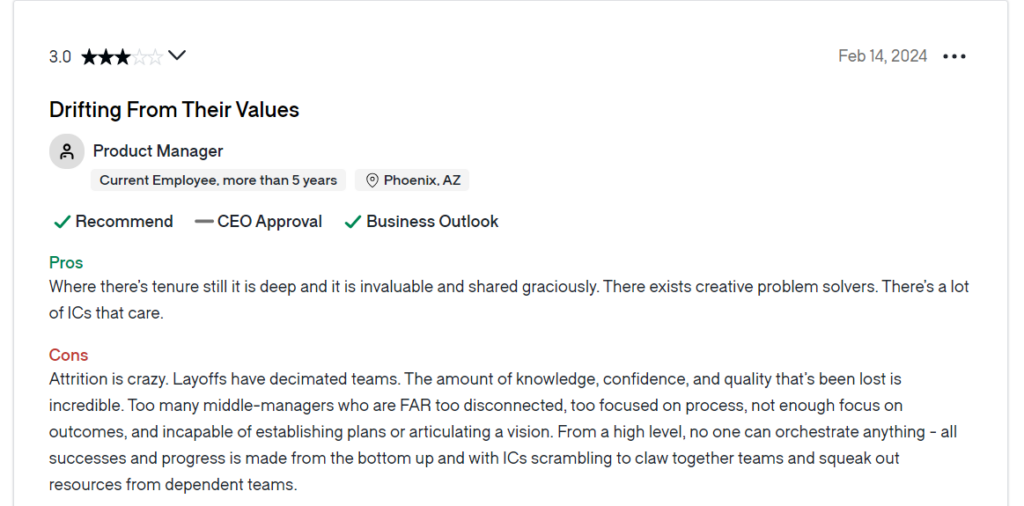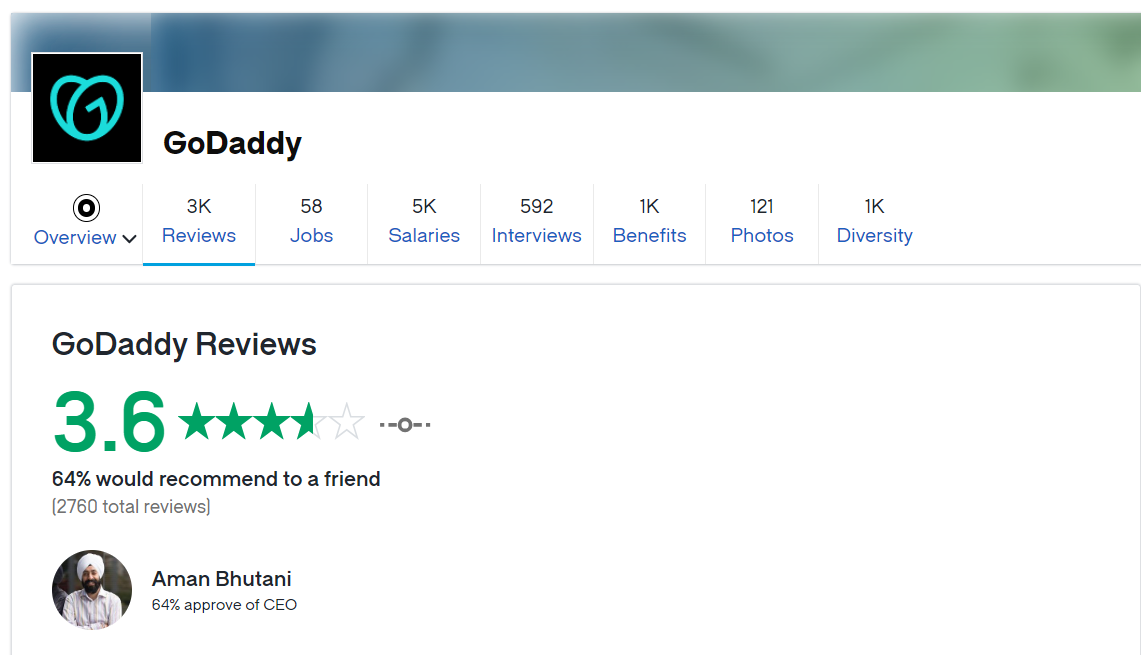In recent months, we published an article on GoDaddy.com‘s excellent performance. It was so positive that some accused us of a sponsored post. Since then, the company’s stock market valuation has risen sharply which shows that stock investors believe the company is moving in the right direction. As we know, increasing profitability in mature businesses – especially in the web hosting industry – is not something eminently simple. You can get more customers, cross-sell more services (which GoDaddy does brilliantly – we are in the process of writing an article about crosselling in the web hosting industry, where we will point them out as an example of how it should be done), increase prices for customers once again or…. make redundancies and automation through AI (which usually means layoffs). We decided to take a closer look at this and juxtapose it with what GoDaddy employees at GlassDoor.com have to say.
Automation and AI: Progress or Problem?
GoDaddy’s automation and implementation of artificial intelligence-based solutions are a response to global technology trends, but as it happens, there are two sides to every coin. Company employees note that the focus on AI and automation is leading to a kind of alienation of their role. “We are trying to keep up with the latest trends, including AI and self-service, which is proving to be far from ideal for many of our customers and ourselves,” says one employee. Focusing on technology, while increasing efficiency, can neglect the human aspect of service, which is especially important in the service industry, where personal relationships with customers are key.
Of course, AI is changing the entire IT industry – not just web hosting. If any company were to look for the fastest and most business-impacting way to leverage artificial intelligence it would be in the area of customer service. For support staff, of course, this is not good news….
Outsourcing and layoffs: cost savings in the shadow of quality
The outsourcing strategy that GoDaddy is adopting to cut costs is also raising questions among employees about the long-term effects on corporate culture and employee engagement. “Work seems to be delegated more and more to global partners, which is changing the DNA of our company month by month,” explains another employee. While delegating responsibilities to outside companies can bring financial benefits, it can also erode internal consistency and reduce control over service quality.
While investors may be pleased with GoDaddy’s improved financial performance, employees are feeling the pressure of cost cuts and job insecurity. “Layoffs are almost a daily occurrence for us now, and what was once an energetic culture of innovation is now turning into a culture of fear,” says another employee. The long-term consequences of such strategies can be dangerous, as discouragement and lowered morale can lead to a decline in productivity and service quality.
In considering the impact of GoDaddy management’s decision on the company’s internal climate, it is worth citing one of the harsher opinions of an employee that relates directly to the relationships and atmosphere in the company’s top echelons. This opinion illustrates the picture of a toxic work environment that is created not only by constant organizational change, but also by interpersonal behavior at the top of the corporate hierarchy.
Direct opinion on the actions of management:
“My individual manager is great, but I talk to him about what is going on above him and it’s dog eat dog. Infighting, leaders constantly backstabbing each other. Most of the leadership who were pro-employee and pro-culture have left to ‘spend more time with family’ besides one person – and he was removed from his job and, quite literally, put onto the task of figuring out what tools and benefits they should cut to save money. That was his announced job – figure out how to cut tools and benefits.”
This quote reveals not only the tensions between members of the top management, but also how these conflicts affect employees’ perception of the company. An atmosphere of fighting over positions and mutual “backstabbing,” as the employee describes it, can lead to an erosion of trust between employees and management and cause a lowering of morale within teams.

Seeking sustainability
In light of these comments, GoDaddy faces the challenge of striking a balance between meeting investors’ expectations and ensuring the satisfaction and security of its employees. Focusing on a long-term strategy that balances technological innovation and the human dimension of work may prove crucial to the company’s sustainability. As employees’ experiences show, any decision to cut costs and automate should be carefully considered, taking into account not only the financial benefits, but also the impact on the team and the overall organizational culture.
GoDaddy’s analysis of employee feedback provides valuable insights into the interior of this rapidly changing company in the AI era. Employees point to a variety of challenges, from growing organizational chaos to perceived tensions within the board of directors that cast a shadow over the day-to-day work and morale of the teams. On the one hand, employee frustration stems from constant change, pressure for results, and a sense of instability and unpredictability in their role at the company.
On the other hand, GoDaddy’s management faces the difficult task of balancing investor expectations with the needs and well-being of its employees. It should be remembered that on the day Steve Jobs was fired from Apple, the company recorded its highest share price increase in many years. That was decades ago but I don’t think much has changed in that regard.
Investors expect an increase in profitability and operational efficiency, which in mature businesses often involves difficult restructuring and automation decisions. Management is responsible for implementing a strategy that aligns with the company’s long-term business goals, while ensuring that these changes are made in a way that minimizes negative impacts on the team.
In order for GoDaddy to continue to prosper as a leader in the web hosting industry, it will become crucial to strike a balance between innovation and maintaining a satisfying, stable work environment for its employees. This means not only listening and responding to the immediate needs of the team, but also involving employees in decision-making and changes that directly affect them. Of course, it’s hard to imagine asking employees to implement AI that will de facto replace their jobs.
In these dynamic times for both GoDaddy and the technology industry as a whole, the ability to adapt and balance different interests will become key to long-term success and innovation.
Lukasz Gawior
With nearly 20 years in the hosting industry, an expert in building and scaling hosting products. Founder of multiple hosting companies, involved in M&A projects and in creating software tailored to the needs of hosting providers.
